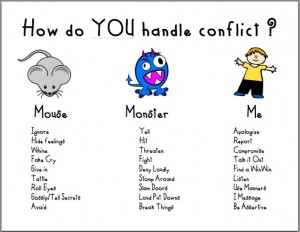Conflict Resolution
Conflict is a normal part of any healthy relationship. No two people can be expected to agree all the time. Learning how to deal with conflict, rather than avoiding it, is crucial to maintaining healthy relationships. When conflict is managed poorly, it can harm a relationship, but when handled in a respectful, positive way, conflict provides an opportunity to strengthen the bond between two people. By learning these skills for conflict resolution, you can keep your personal and professional relationships healthy and growing.
Understanding conflict in relationships
Conflict occurs whenever people disagree over their values, motivations, perceptions, ideas, or desires. Sometimes these differences appear trivial, but when a conflict triggers harsh feelings, a deep personal need is often at the core of the problem. These needs can be a need to feel safe and secure, a need to feel respected and valued, or a need for greater closeness and intimacy.
What is conflict?
A conflict is more than just a disagreement. It is a situation in which one or both parties perceive a threat (whether or not the threat is real). Conflicts can continue to build if ignored because they involve perceived threats to our well-being and survival, they stay with us until we face and resolve them. We respond to conflicts based on our perceptions of  the situation, not necessarily to an objective review of the facts. Our perceptions are influenced by our life experiences, culture, values, and beliefs. Some conflicts trigger harsh emotions. If you aren’t comfortable with your emotions or able to manage them in times of stress, you won’t be able to resolve conflict successfully.
the situation, not necessarily to an objective review of the facts. Our perceptions are influenced by our life experiences, culture, values, and beliefs. Some conflicts trigger harsh emotions. If you aren’t comfortable with your emotions or able to manage them in times of stress, you won’t be able to resolve conflict successfully.
Conflict is an opportunity for growth. When you’re able to resolve conflict in a relationship, it builds trust. You can feel secure knowing your relationship can survive challenges and disagreements.
There are many ways to handle conflict, here is a comparison of healthy and unhealthy ways to manage conflict:
Unhealthy ways of managing conflict:
- An inability to recognize and respond to the things that matter to the other person.
- Explosive, angry, hurtful, and resentful reactions.
- The withdrawal of love; resulting in rejection, isolation, shaming, and fear of abandonment.
- An inability to compromise or refusal see the other person’s side.
- The fear and avoidance of conflict, or the expectation of bad outcomes.
Healthy ways of managing conflict:
- Recognizing and responding to things that matter to the other person.
- Calm, non-defensive, and respectful reactions and conversations.
- A readiness to forgive and forget, and to move past the conflict without holding resentments or anger.
- The ability to seek compromise and avoid punishing.
- A belief that facing conflict and working to resolve it is the best thing for both sides.
 To successfully resolve a conflict, you will need to learn and practice two core skills:
To successfully resolve a conflict, you will need to learn and practice two core skills:
1. The ability to quickly reduce stress in the moment
2. The ability to remain comfortable enough with your emotions to react in constructive ways even in the middle of an argument or a perceived attack.
- Conflict is never easy, and resolving it can sometimes be difficult too. However, with these fun activities, you will hopefully have fewer conflicts blowing out of proportion
